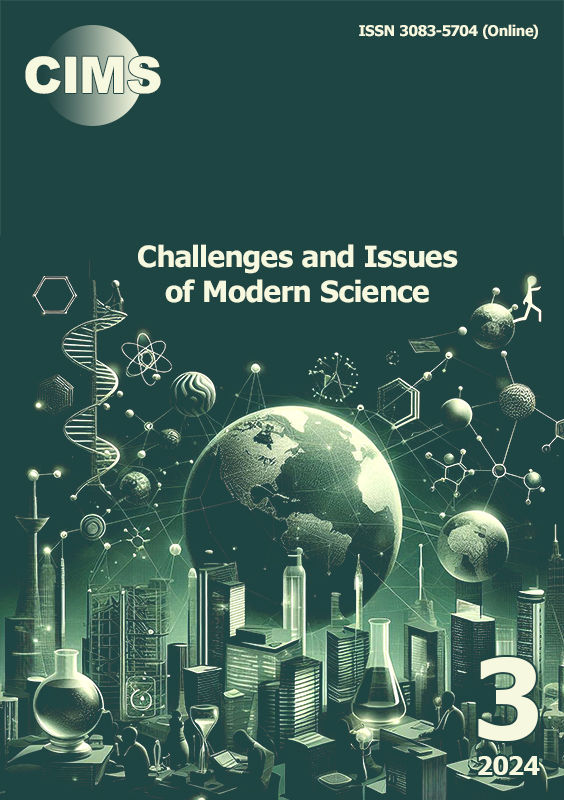Role of Emotional Intelligence and Professional Culture in the Development of Higher Education Institutions
Keywords:
emotional intelligence, higher education development, professional culture, institutional resilience, student engagement, leadership, educational strategyAbstract
Purpose. This study analyzes the role of emotional intelligence (EI) in shaping effective development strategies for higher education institutions (HEIs), emphasizing professional culture. It seeks to determine how EI strengthens institutional dynamics, enhances team management, and promotes an inclusive environment. Design / Method / Approach. A mixed-methods approach examines the benefits of EI in higher education. Using qualitative and quantitative data, the study incorporates insights from experts and recent research to provide a comprehensive view of EI and professional culture interaction within HEIs. Findings. Findings reveal a strong correlation between high EI levels and improved institutional outcomes. Leaders with advanced EI foster open communication, understand team and student needs, and cultivate collaboration. A professional culture centered on EI offers HEIs a strategic advantage in today's educational landscape. Theoretical Implications. This research enhances understanding of EI as a critical competency in educational leadership, essential for fostering positive professional culture and driving institutional success. Integrating EI into leadership practices builds an adaptable, cohesive environment conducive to personal and academic growth. Practical Implications. The study provides actionable insights for HEIs seeking to improve team dynamics and institutional culture, including EI-based training programs, prioritizing EI in hiring, and encouraging professional development. Originality / Value. This article bridges the gap between EI theory and its practical application in HEIs, emphasizing relevance to leadership and professional culture. Research Limitations / Future Research. imitations include potential biases in self-reported EI data and the need for longitudinal studies to examine EI's lasting impact on culture. Future research should explore diverse cultural settings to better understand EI's role in various educational contexts. Paper Type. Review Paper.
Downloads
References
Крупський, О. П., & Кіба, К. С. (2012). Взаємозв’язок між емоційною компетентністю та лідерством як складниками педагогічної діяльності. Educational Dimension, 36, 222-229. https://doi.org/10.31812/educdim.v36i0.3416
Крупський, О. П., & Стасюк, Ю. М. (2010). Формування інформаційної компетентності майбутнього менеджера-економіста в сучасному освітянському просторі. Личность в едином образовательном пространстве: сборник научных статей I Международного образовательного форума, 68-71. https://philarchive.org/archive/KRU-20
Cunha, M. N., & Krupskyi, O. P. (2024). Inteligência social: desvendando a ciência das relações humanas. In Culture and identity: Perspectives in the human sciences (pp. 79–97). Editora Contemporânea. http://surl.li/ccxxva
Elmi, C. (2020). Integrating social emotional learning strategies in higher education. European journal of investigation in health, psychology and education, 10(3), 848-858. https://doi.org/10.3390/ejihpe10030061
Gilar-Corbi, R., Pozo-Rico, T., Pertegal-Felices, M. L., & Sanchez, B. (2019). Emotional intelligence training intervention among trainee teachers: a quasi-experimental study. Psicologia: Reflexão e Crítica, 31, 33. https://doi.org/10.1186/s41155-018-0112-1
Kellot, T. (2024). Empowering Students with Emotional Intelligence. Science of mind. https://scienceofmind.org/education-and-emotional-intelligence/
Khassawneh, O., Mohammad, T., Ben-Abdallah, R., & Alabidi, S. (2022). The relationship between emotional intelligence and educators’ performance in higher education sector. Behavioral Sciences, 12(12), 511. https://doi.org/10.3390/bs12120511
Landry, L. (2021). Why Emotional Intelligence Is Important in Leadership. Harvard Business School Online. https://online.hbs.edu/blog/post/emotional-intelligence-in-leadership
Lee, I. H. (2024). Emotional Intelligence in Higher Education: The Key to Successful Collaboration. LinkedIn Corporation. http://surl.li/umxjle
Lynch, M. (2016). Examining the Impact of Culture on Academic Performance. The Edvocate. https://www.theedadvocate.org/examining-the-impact-of-culture-on-academic-performance/
Makedon, V. V., Krasnikova, N., Krupskyi, O. P., & Stasiuk, Y. (2022). Arrangement of digital leadership strategy by corporate structures: a review. Ikonomicheski Izsledvania, 31(8), 19–40. https://tinyurl.com/2-s2-0-85143514408
McDonald, A. T. (2021). The Importance of Cultivating Emotional Intelligence in Schools. National Association of Independent Schools. https://www.nais.org/magazine/independent-teacher/spring-2021/the-importance-of-cultivating-emotional-intelligence-in-schools/
Rosowsky, D. V., & Hallman, K. (2020). Communicating Culture in a Distributed World. Inside Higher Ed. http://surl.li/nextpp
Sánchez-Álvarez, N., Berrios Martos, M. P., & Extremera, N. (2020). A meta-analysis of the relationship between emotional intelligence and academic performance in secondary education: A multi-stream comparison. Frontiers in psychology, 11, 1517. https://doi.org/10.3389/fpsyg.2020.01517
Shaw, L., Grose, J., Kustra, E., Goff, L., Ellis, D., & Borin, P. (2021). Cultivating an institutional culture that values teaching: Developing a repository of effective practices. To Improve the Academy: A Journal of Educational Development, 40(1). https://doi.org/10.3998/tia.962
Shengyao, Y., Xuefen, L., Jenatabadi, H. S., Samsudin, N., Chunchun, K., & Ishak, Z. (2024). Emotional intelligence impact on academic achievement and psychological well-being among university students: the mediating role of positive psychological characteristics. BMC psychology, 12(1), 389. https://doi.org/10.1186/s40359-024-01886-4
Vivek, R., & Krupskyi, O. P. (2024). EI & AI in leadership and how it can affect future leaders. European Journal of Management Issues, 32(3), 174-182. https://mi-dnu.dp.ua/index.php/MI/article/view/512
Vorobiova, V., Krupskyi, O., & Stasiuk, Y. (2023). The Role of Digital Technologies in Modern Trade: a Study of Global Trends and Prospects for Ukraine. Economic Journal Odessa Polytechnic University, 2(24), 44–55. https://doi.org/10.15276/ej.02.2023.5
Downloads
Published
Issue
Section
License
Copyright (c) 2024 Yuliia Stasiuk, Iryna Vainilovych, Andrii Kobchenko (Author)

This work is licensed under a Creative Commons Attribution 4.0 International License.
All articles published in the journal Challenges and Issues of Modern Science are licensed under the Creative Commons Attribution 4.0 International (CC BY) license. This means that you are free to:
- Share, copy, and redistribute the article in any medium or format
- Adapt, remix, transform, and build upon the article
as long as you provide appropriate credit to the original work, include the authors' names, article title, journal name, and indicate that the work is licensed under CC BY. Any use of the material should not imply endorsement by the authors or the journal.



















